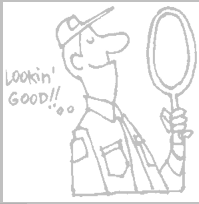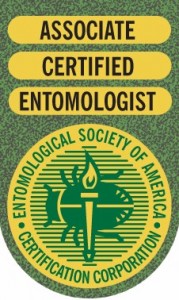Just the other day one of my techs came around the backside of a home he was treating only to find a car parked behind him and a man standing there waiting. (this house was in the middle of NOWHERE & the closest neighbor was 1/2 mile away) He asked if he needed to move the truck for him and the gentleman simply said “No, I’m with the Department of Agriculture & I’m here to inspect your truck.”
State Inspectors have the right to go anywhere you go (or so I’m told) and can ask for any information or have you show them anything on your truck they wish. While this is still America and you do have rights, resisting these inspectors is usually not such a great idea.
Most often an encounter like my guy had is either by chance or the inspector is following up on a complaint or investigation. Since I’m sure you have nothing to hide it’s best to just get it over with and cooperate as best you can. In all my years I’ve only been stopped on the road once and it was a ‘slip and fall’ complaint at a restaurant where they thought I had sprayed to much. Since I serviced the place at 6 am and the fall happened around lunch time we both got a good laugh but he still took the time to examine my ride pretty carefully.
State Inspectors are usually veterans of pest control
One thing to note is that most inspectors are retired pest control professionals who’ve spent many years doing what you’re doing right now. This is a good thing because they understand your side of things and tend to give you the benefit of the doubt if you seem half way competent. This can be trouble however if you try to pull one over on them or buffalo your way through an answer to any specific questions they may have. Florida recently hired 19 new inspectors mainly to crack down on rogue operators and while most fit the mold I just described there are a few who have the right degrees in order to do the work but little if any pest control experience. One thing they all have in common is that they are simply fact finders and suppose to be impartial, winks and nods might work if your vehicle is unsecured but cross the line on a more important rule or application and you’ve probably not heard the last of it.
What kinds of things do they look for?
On a road inspection these Department Agents look to make sure you have your proper ID, that your vehicle is secure and you don’t have a gallon of Diazonon on the front seat. That you have msds and labels and proper PPE’s. (personal protective equipment) They also want you to demonstrate that you have a working knowledge of what it is you are working with. They may ask you what you have in your B&G or back pack and follow up with a few questions. “What’s the active ingredient? What percentage are you running and where are you using it?” If you say Demon WP and you just did a whole house flea job, you might just have a long afternoon.
For office inspections (which they do mine at least once per year) they go through your storage area and make sure you have proper signs, you’re locked up and don’t have anything for which you’re not licensed. In the office they’ll ask to see continuing education proof for your techs (if any) and insurance and they may also ask you routine questions about 2 or 3 of the main products you use. As long as you’re in compliance it’s usually a quick visit followed by some ‘good ol days’ stories or even an inquisitive question about another company in town that may be in their cross hairs.
you’re locked up and don’t have anything for which you’re not licensed. In the office they’ll ask to see continuing education proof for your techs (if any) and insurance and they may also ask you routine questions about 2 or 3 of the main products you use. As long as you’re in compliance it’s usually a quick visit followed by some ‘good ol days’ stories or even an inquisitive question about another company in town that may be in their cross hairs.
What if the questions are more direct?
Should you get pointed inquiries or specific questions I’d say their there for a reason. Perhaps a customer or somebody filed a complaint. Years ago one inspector came to the office where I worked and did this very thing. It was a home based firm and it turned out one of the neighbors was worried about the chemicals. Both my bosses were gone but that didn’t stop him and we went through every nook of the storage shed and I was peppered with a lot of questions. It was only towards the end of his inspection that he let me know why he was there. Pointed and direct questions should be your first clue to start minding your P’s & Q’s and pray to God that you have graphs, properly filled out paper work and contracts that spell everything out that have been signed.




